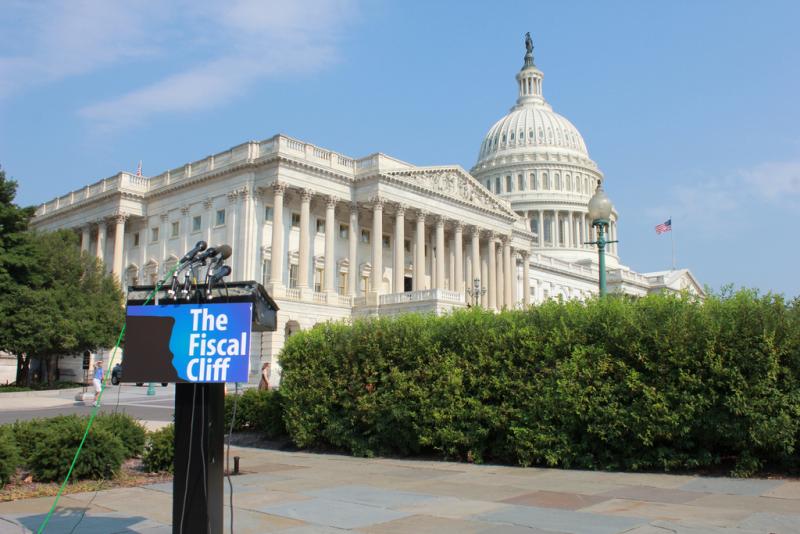The Biggest Threat To The United States Is Not The Fiscal Cliff

I do not need to explain that there is something fundamentally wrong with the current political culture on Capitol Hill. However, the danger our country faces from this hyper-politicized culture is not recognized nearly as much as it should be. In its traditional form, democracy serves as a powerful force for progress and cohesion. In the political arena, it allows diverse principles, virtues and priorities to be melded together to create mutually beneficial policies. Every voice can be heard, and those that are louder than others are prevented from muting the rest.
However, democracy is not automatically and unequivocally beneficial. It has a dark side. Unfortunately, this is the side that “we the people” have been witnessing. The United States is still a democracy, but it is one without compromise, and a democratic government lacking the ability to compromise is one that is inherently unable to function. Alongside the challenges the United States has faced in the past decade, this problem is often viewed as a relatively minor one. However, our policymakers’ actions over the past two years reveal the true magnitude of this threat.
During the early summer of 2011, Congress was faced with the task of raising the amount of money the United States government is legally allowed to borrow. Clearly not the favorite action of our legislators, raising the debt ceiling is a necessary responsibility. Since 1962, the debt ceiling has been raised 74 times, 10 times since 2001. Over the past few decades, this responsibility has been nothing more than an annoyance.
However, what occurred during the summer of 2011 was nothing short of a travesty. Our elected officials were incapable of coming to an agreement on raising the debt ceiling until just hours before the United States government defaulted on its payments. Congress held the debt ceiling hostage for political gains, something Ben Bernanke, the chairman of the Federal Reserve, specifically warned against.
In addition to hyper-politicization, this standoff occurred, in large part, because of Washington’s inability to agree on simple facts. A disturbing number of congressmen and -women actually viewed not raising the debt ceiling as the appropriate action. In their world, cutting off the Treasury’s ability to borrow more money would do nothing more than halt the terrible spending problem in Washington. In the real world, it would prevent the United States from paying interest to those who hold U.S. Treasury bonds, cause the global economy to lose decades’ worth of confidence in the “full faith and credit on the United States government,” end the dollar’s position as the global reserve currency, collapse world trade and finance, and materialize a global economic meltdown before our very eyes. (Not to mention all the government programs that would automatically go bankrupt.)
Although our policymakers ultimately avoided such a catastrophe, the U.S. economy did not go unpunished. There were massive stock market sell-offs during the debt ceiling debate. Confidence, a very fragile aspect of a free market economy, was crippled, with the consumer confidence index dropping from 59.2 to 44.5. In short, the entire economic recovery slowed down at a time when it should have been speeding up.
What was even more disturbing about this situation was that Congress did not even adequately carry out its official duty. What rose out of the debt ceiling debacle was a relatively small raise in the debt ceiling, accompanied by certain conditional raises. These conditional raises rely on Congress’s ability to compromise on even more spending cuts than were originally proposed in the bill. If Congress cannot reach such an agreement by the end of 2012, then automatic, across-the-board spending cuts will occur. The potential of these cuts, in combination with the expiration of the Bush Tax Cuts at the end of 2012, is now known as the Fiscal Cliff.
When put in the proper context, the Fiscal Cliff becomes much more than just an economic debacle. The Fiscal Cliff is not a product of external economic forces; it is solely a product of our policymakers’ inaction. The prospect of the Fiscal Cliff was supposed to act as a gun to their heads, forcing them to compromise on spending and tax reform. As we move closer toward the end of the year, a productive compromise seems more and more implausible. In fact, certain policy makers are actually entertaining the idea of going over the cliff, despite the Congressional Budget Office’s warning that it would send the country back into a recession, driving the unemployment rate back above nine percent. There is no more striking example of a dysfunctional democratic system.
The evidence is not limited to these two issues – I cannot think of one piece of legislation passed to help speed up the recovery. However, both the debt ceiling debacle and the Fiscal Cliff, the two most significant economic events of the last two years, reveal a disturbing reality: democracy is broken in the United States. Of course, we are still technically a democracy. However, our elected officials have proven nothing more than that they are capable of avoiding disasters they themselves create. On January 1, Americans will see if they can even keep that up.
Many have tried to point their fingers at the one responsible for America’s political woes, but they fail to realize that their fingers cannot possibly find the culprit. It is our political culture that has taken a dark turn. While the above examples are limited to Congress, they are not the only relevant actors. They are simply in the spotlight. Compromise, trust, facts, and empathy are severely lacking in the public arena, as well as the political one. Until we realize and correct this wrong turn, true democracy in America is a thing of the past.
Reach Contributor Alex Blow here.



